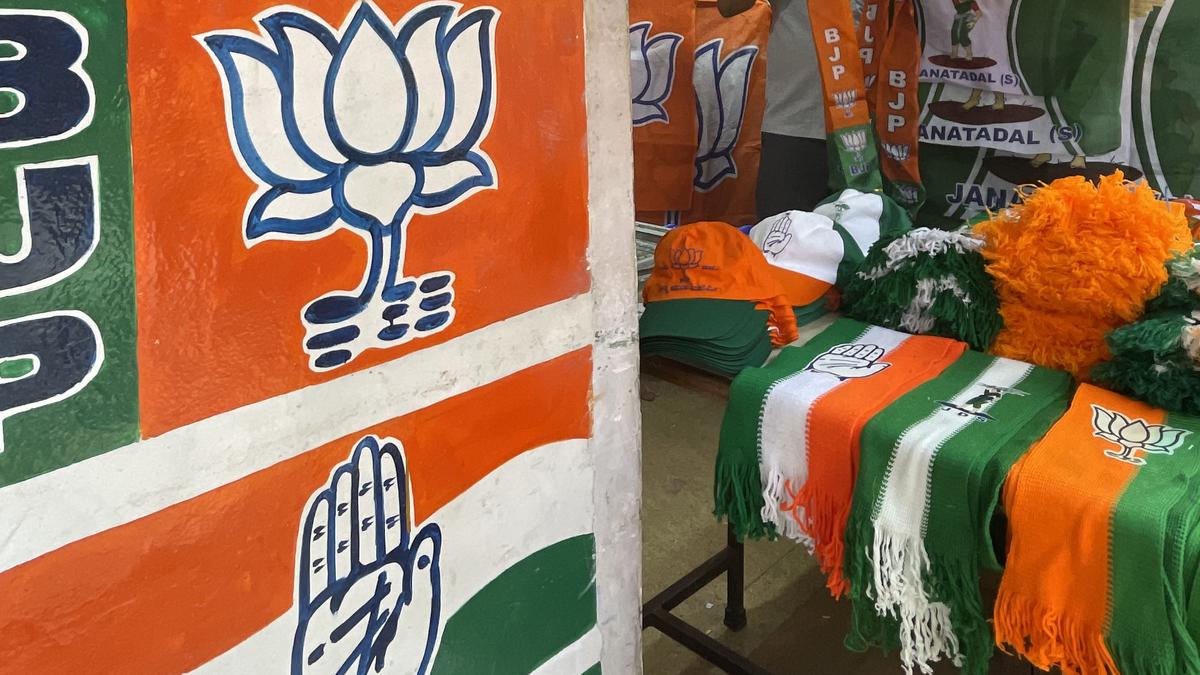
Smaller parties with little vote share may make a big difference in some pockets of Karnataka
The Hindu
While the Congress fears that most of the smaller parties will splinter its votes in the upcoming Karnataka Assembly election, the BJP and JD(S) seem less worried about the threat they pose
While politics in Karnataka has largely remained triangular, several political parties, the most prominent among them in recent times being the Aam Aadmi Party (AAP), are trying to gain a toehold. In a State where the vote share to seat share conversion is already an uphill task for the Congress, the party fears that most of the smaller parties will splinter its votes. Relatively, the Bharatiya Janata Party (BJP) and Janata Dal-Secular (JD-S) seem less worried about the smaller parties.
Though the AAP has failed to make any impact in the State (the party contested 28 seats and managed to secure only 0.55% votes in 2018), fresh from the Punjab victory and a good show in Gujarat, this it time has 213 candidates in fray.
“Being branded an urban party we were expected to do well in Bengaluru, but the AAP has found more resonance in pockets of north Karnataka’s hinterland, where there is a dearth for alternatives, and [the region] faces serious governance deficit,” Pruthvi Reddy, Karnataka convenor for the AAP said.
With the AAP having eaten into the vote share of the Congress in Delhi, Punjab and Gujarat, it was expected to follow a similar pattern in Karnataka, too. However, the party hopes to become the third wheel in north Karnataka, once occupied but gradually lost by the JDS. “Our surveys suggest we have a good chance in several constituencies, including Rona, Sagar, Bidar South, and Bagepalli,” an AAP leader. However, the party suffered a few setbacks in the run-up to the elections, and suffers from the lack of a “recognisable face” in the State.
The new party on the block in the upcoming election is the Kalyana Rajya Pragathi Paksha, founded by mining baron and former BJP Minister G. Janardhan Reddy. It has put up candidates in 49 constituencies, predominantly in the Kalyana Karnataka region, a traditional stronghold of Congress. Mr. Reddy, who played a key role in the BJP sweeping the region in 2008, has claimed he will mop up both BJP and Congress votes. But a senior Congress leader claimed that he was no more than “BJP’s Trojan horse.” With his politically more popular friend B. Sriramulu and his two MLA brothers remaining in BJP, Mr. Janardhan Reddy’s influence will be limited, politicians from the region predict.
The Bahujan Samaj Party (BSP), which was in an alliance with the JDS in 2018, had won a lone seat from Kollegal. But its candidate, N. Mahesh, later switched to BJP. This time, the BSP has decided to go alone and is contesting in 137 seats. “Our alliance with the JDS helped them more than us,” a prominent leader of the party said.
Meanwhile, Karnataka Rashtra Samithi, a new party floated by Ravi Krishna Reddy, whose earlier forays into electoral politics as an independent candidate failed repeatedly, has put up candidates in 200 constituencies. The party is pitching an anti-corruption plank.

Mangaluru-Bengaluru National Highway 75, and Mani (Mangaluru) - Mysuru NH 275 have been in various stages of development for the past many years. These highways often are closed during heavy rains. The Mangaluru-Hassan rail connectivity too gets disturbed during heavy rains. In such a situation, air fares between Mangaluru and Bengaluru shoot up, going up to ₹10,000 per person.





















 Run 3 Space | Play Space Running Game
Run 3 Space | Play Space Running Game Traffic Jam 3D | Online Racing Game
Traffic Jam 3D | Online Racing Game Duck Hunt | Play Old Classic Game
Duck Hunt | Play Old Classic Game










